Gay Best Friend: Malcolm in "Darling" (1965)
 Thursday, October 21, 2021 at 6:05PM
Thursday, October 21, 2021 at 6:05PM A series by Christopher James looking at the 'Gay Best Friend' trope
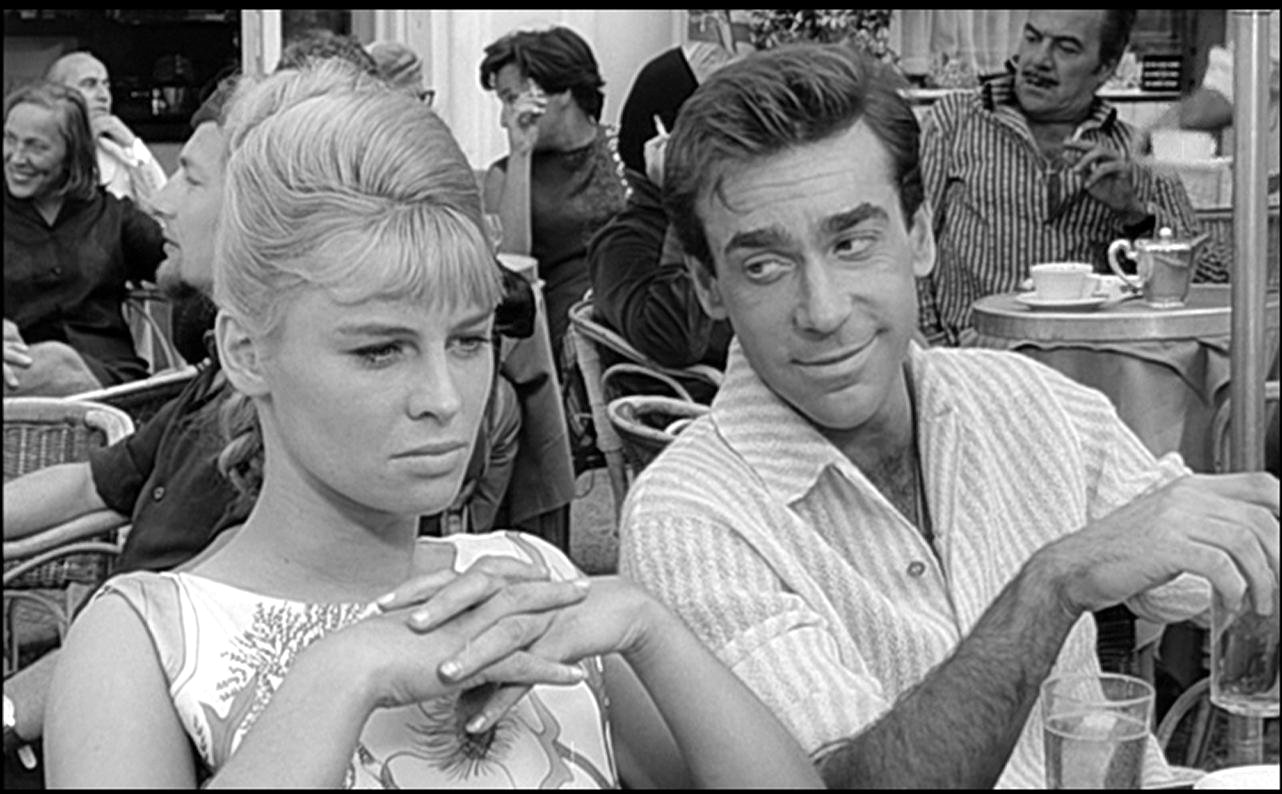 Not pictured: The waiter that Diana (Julie Christie) and Malcolm (Roland Curran) were checking out.How can one be truly breaking convention if the act of breaking away is itself a convention? This is the plight of Diana Scott, the role that earned Julie Christie an Oscar win for Best Actress. Diana uses her feminine wiles to rise to the top of the English fashion scene, creating scandal everywhere she goes. She breaks all the conventions of how a “good girl” of the 50s would behave. While this makes her exciting, what is behind her social climbing antics? Is her rebellion ushering in a new progressive wave, or is she just rebelling to rebel? If the case is the latter, why is that something people should respect, rather than jeer?
Not pictured: The waiter that Diana (Julie Christie) and Malcolm (Roland Curran) were checking out.How can one be truly breaking convention if the act of breaking away is itself a convention? This is the plight of Diana Scott, the role that earned Julie Christie an Oscar win for Best Actress. Diana uses her feminine wiles to rise to the top of the English fashion scene, creating scandal everywhere she goes. She breaks all the conventions of how a “good girl” of the 50s would behave. While this makes her exciting, what is behind her social climbing antics? Is her rebellion ushering in a new progressive wave, or is she just rebelling to rebel? If the case is the latter, why is that something people should respect, rather than jeer?
The tagline of Darling (1965) reads: “A powerful and bold motion picture...made by adults...with adults...for adults!” It’s amazing to see what was bold by 1965 standards. An English production, Darling fittingly feels like part French-New-Wave, part mainstream Hollywood. The topics of sex, abortion, homosexuality and the blanket “sin” of adult life hang over every scene, even if very little is explicit. This illustrates that the “gay best friend” trope, among others, was once considered shocking or bold. By the 1990s, as we've witnessed in this series, boldness gave way to the expected, as the trope became overused...
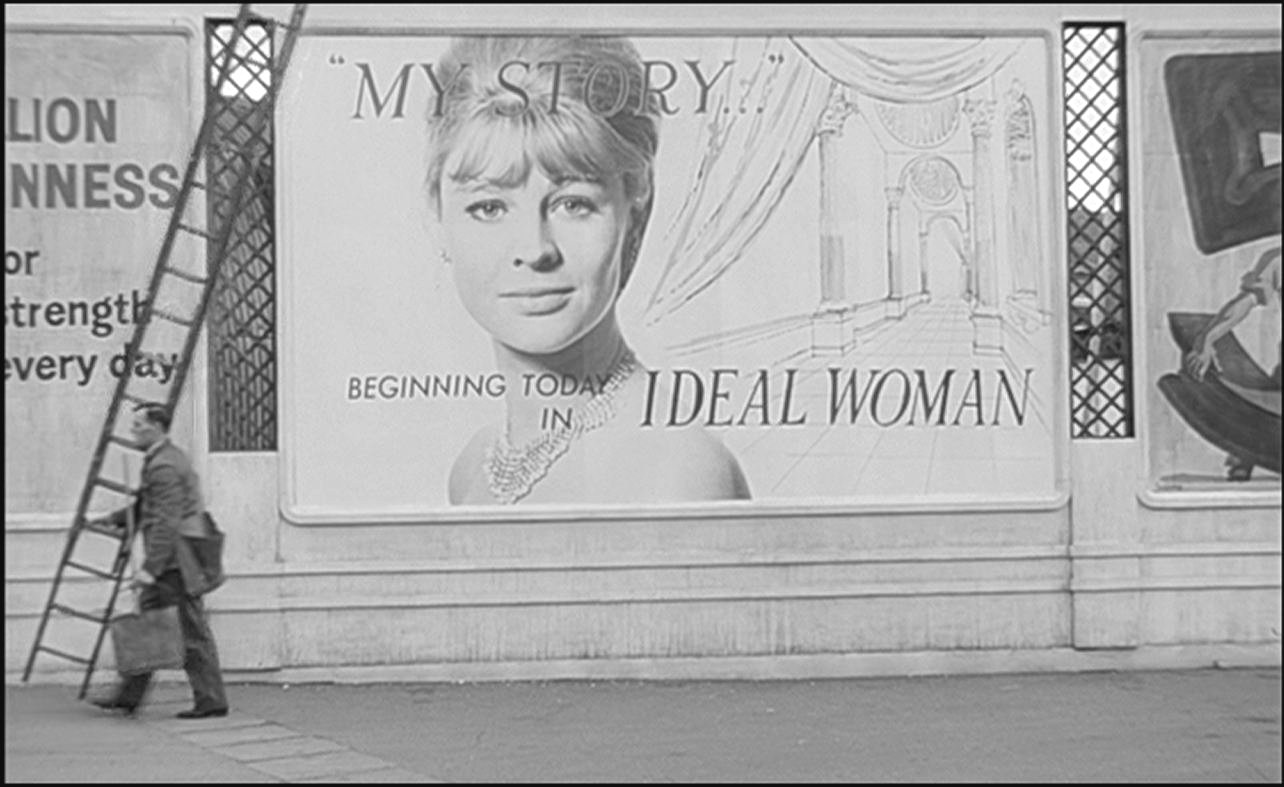 Julie Christie won Best Actress for her work as Diana, a social climber who becomes the portrait of ideal womanhood while chasing an ideal that will always be unobtainable.
Julie Christie won Best Actress for her work as Diana, a social climber who becomes the portrait of ideal womanhood while chasing an ideal that will always be unobtainable.
Interviewee: London Man: Um, talking as a Londoner, I think, in London, itself, the amount of - how rife homosexuality has become, in London, itself. I would say again, in retrospect, that a few years back, that, again, two or three years ago, you were very blatantly approached by different people in different places.
For better or worse, Darling delights in the amoral exploits of its lead, Diana Scott (Christie). The social climbing fashionista always insists that she doesn’t mean to cause trouble, even as she actively causes trouble. It’s the classic sign of a Woman Who Lies To Herself™. She never wants to break up a family, but is more than willing to be the demanding mistress. She doesn’t want to be religious, but will become an Italian princess. There’s even one moment where she delights in having black neighbors, only to want them gone in the very next shot. Diana’s mind changes at just the shift of a wind.
Darling uses Diana to look at the generational divide between the old and young during the swinging sixties. Thus, she traffics in all things that could be considered taboo, namely sex. This makes her the perfect person to take up a gay best friend. Director John Schlesigner, who would go on to make the landmark Best Picture winner Midnight Cowboy, knows how to place Diana’s escapades against a more rigid, disapproving world. An interview with Londoners on what they like least about London causes the public to list a variety of vices that could all be lobbied against Diana and the company she keeps.
Preceding our introduction of Malcolm is a particularly eye-opening trip to Paris for Diana. Miles takes her to a series of parties involving strip teases, implied orgies, cross dressing and other debaucherous actions. Part of the shenanigans involves a game where everyone crossdresses and mimics someone in the party. One man gives a harsh, yet accurate, Betty Boop-esque impersonation of Diana which makes her nearly want to leave. It’s only until she knows how to throw the game back in Miles’ face that she knows how to have fun in this Schlesinger version of a Parisian “underworld''. There’s a derision of the party and the fluid lifestyle of the guests for most of the scene. However, at least Darling understands that desire can come in many forms.
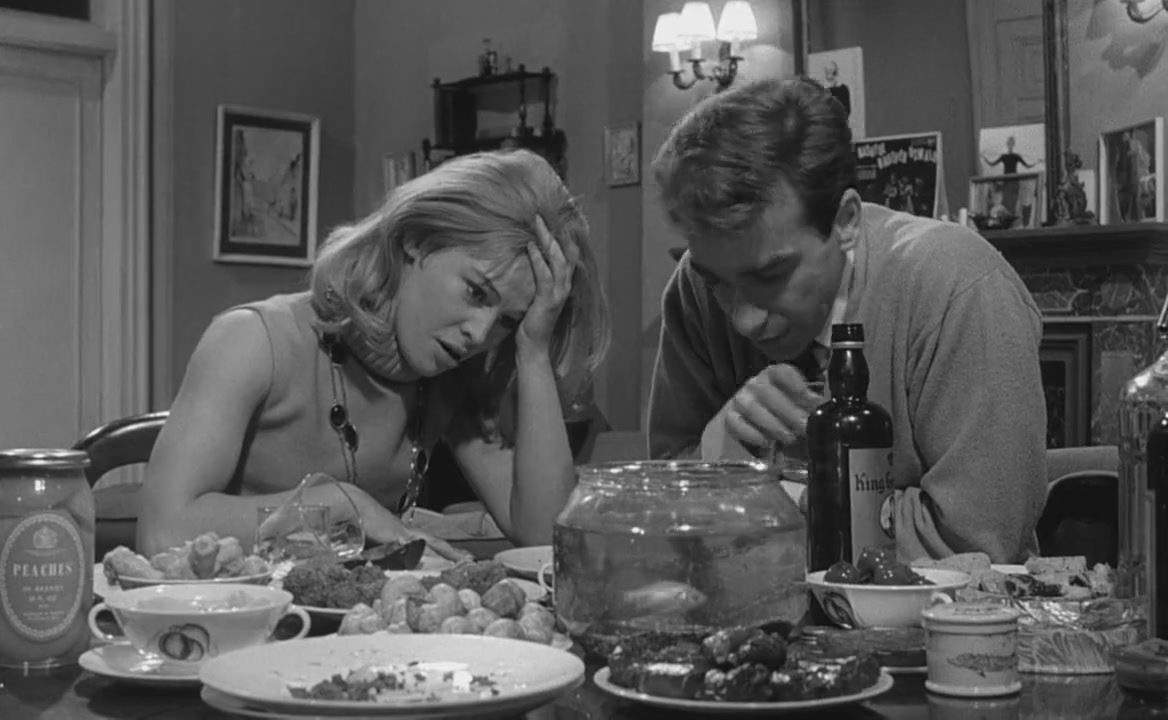 We love friendships that are drunk and messy.
We love friendships that are drunk and messy.
Diana Scott: [drunkenly] Oh, why is life like a piss pot!
Malcolm: Well, you see, I have the answer to that. It's the bomb-loving. It must be.
Diana Scott: That's right. It's the great, big, nasty bomb!
Malcolm: The great, big, nasty bomb! Let's face it, dear. Darling, life is a great big steaming mess!
Diana Scott: Oh, I love you, if no one else does.
Malcolm: No one else does.
Diana Scott: Oh, poor you.
Diana meets Malcolm at a low point in her life and he instantly turns it into a huge positive. A photographer, Malcolm crafts a photo shoot that takes off, branding Diana as the “Happiness Girl.” There’s a bit of a “Fairy Godmother” quality to Malcolm. He gives happiness to Diana, even though neither of them feel truly happy or fulfilled. In another example of Diana’s beguiling vapidness, Diana (and the movie) takes interest in Malcolm, but only in how he relates or mirrors Diana’s true feelings. She feels lost after Robert’s brutal breakup and disillusioned with relationships. Though not explicitly addressed, there are a bevy of reasons that Malcolm might also feel unloved or unable to be in a relationship.
The two journey to Rome for a medieval “Happiness Girl” ad shoot. The two instantly fall in love, not with any one person, but with the country itself. They decide to take an extended vacation, renting the house to just the two of them.
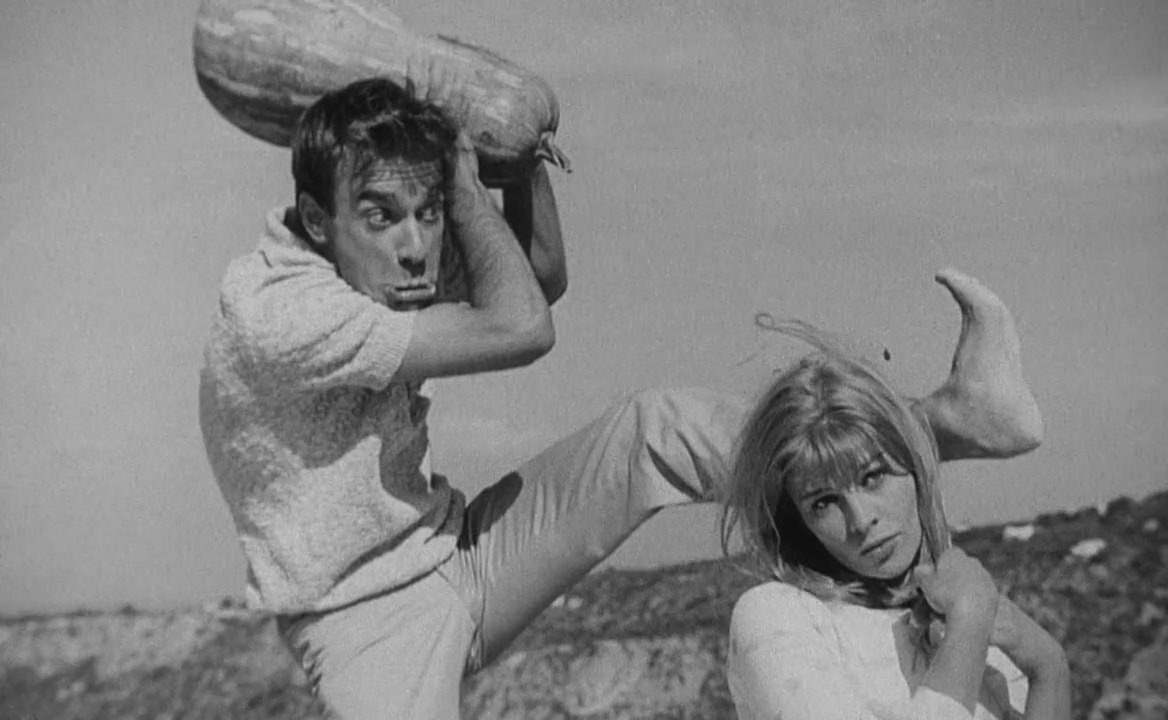 Imagine how insufferable they would be on Instagram...
Imagine how insufferable they would be on Instagram...
Diana Scott: [after she see's Malcolm eyeing their waiter] We are not complicating our holiday with any disgusting sexcapades.
Malcolm: Brother and sister until death us do part?
Diana Scott: Done. Share and share alike.
Malcolm: Everything split down the middle.
Diana Scott: Absolutely.
---------
Diana Scott: [to Malcolm] I was just thinking how nice it would be if we could live here. I could do without sex. I don't really like it that much. If I could just feel - complete.
The two journey to Rome for a medieval “Happiness Girl” ad shoot. The two instantly fall in love, not with any one person, but with the country itself. They decide to take an extended vacation, renting the house to just the two of them. Diana imagines this utopic, sexless existence. However, it’s utopic not because of its platonic nature. She dreams of this future because she thinks removing sex will remove complication. Inherent in this assertion is the assumption that Malcolm is sexless because he won’t have sex with her. She can decide to be celibate, which means that he’ll abide by the same system. The two behave similarly to women and their gay best friends today. For a while all they did was take goofy photos together and ogle cute waiters. However, Diana’s paradise was never to last.
Just as she turned away, Malcolm sneaks out with a hot Italian man in the dead of night. Why does this make Diana so upset? He wasn’t stealing anyone from her, and they weren’t sleeping together. Malcolm’s crime was having a life outside of her realm. The rest of the time in Italy is marred by Diana scrambling while feeling out of place. Earlier in the trip, she had refused the marriage proposal from Cesare (Jose Luis de Villalonga), an Italian prince. Now, as the third banana in her beautiful utopia, getting attention from an eligible bachelor sounds quite nice. She heads back to London soon after and immediately starts going through old boyfriends, such as Robert and Miles. Malcolm awakened something inside her again, a desperation to be loved and fawned over.
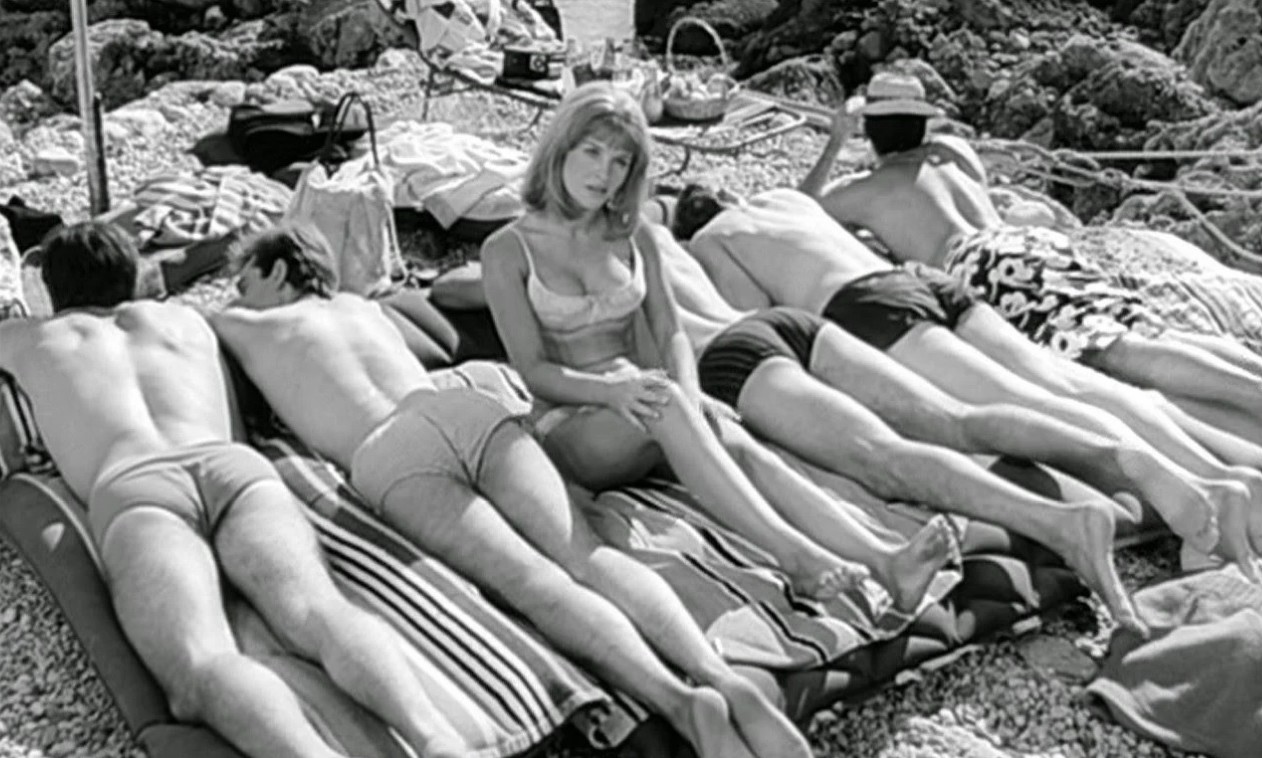 This is where we leave Malcolm... ass up with some hunky men.
This is where we leave Malcolm... ass up with some hunky men.
Though Malcolm is still somewhat coded (the word “gay” is never explicity uttered), it’s interesting how clear and well defined his queerness is. Perhaps that’s why the tagline suggests the movie is so “bold” and so “adult.” We see him lust after other men, hop on the back of vespas (not meant to be an innuendo) and sunbathe with other hot, clearly gay men. Not only that, he’s only vilified by Diana, who comes off more as the butt of the joke than anything. Does Malcolm have depth? No. Does he get to be horny and get railed all over Italy? Sure does!
Coded horniness in a gay best friend isn’t just good by 60s terms, most movies with a typical gay best friend character in the following decades rendered them sexless. Darling is incredibly defined by its times, both positively and negatively. Still, it’s hard to deny that it’s an interesting look at the past - at least the past of a gorgeous, privileged blonde who gets to traverse in any space she wants. Like so many classic antiheroes, Diana rises to the point that she can no longer sustain. She eventually converts to Catholicism, marries the prince, becomes an Italian princess, only to want to take it all back. Here’s hoping Malcolm’s happy ending turned out better than Diana’s did.
previously in this series
pre stonewall
post stonewall
-
Bernstein (Antonio Fargas) in Next Stop, Greenwich Village (1976)
-
Toddy (Robert Preston) & Squash (Alex Karras) in Victor/Victoria (1982)
1990s and the 2000s
-
Hedra Carlson (Jennifer Jason Leigh) and Graham Knox (Peter Friedman) in Single White Female (1992)
-
Gareth (Simon Callow) and Matthew (John Hannah) in Four Weddings and a Funeral (1994)
-
George Downs (Rupert Everett) in My Best Friend’s Wedding (1997)
-
George Hanson (Paul Rudd) in The Object of My Affection (1998)
-
Stanford Blatch (Willie Garson) in Sex and the City (1998 - 2010)
-
Wallace Wells (Kieran Culkin) in Scott Pilgrim vs the World (2010)
The Now



Reader Comments (3)
This movie is not talked about much now when it should have been!
Julie Christie was just divine. I remember that scene where she shed her princess clothes so vividly.
I think Darling's big model is La Dolce Vita. Even though it's pretty dated, it's a lot of fun if you don't take it too seriously, and the gay subplot is handled quite well. It's kind of weird that John Schlesinger does so well and is so progressive (relatively) with the gay elements, yet in four years he would be so retrograde with the overtly gay elements in Midnight Cowboy. Joe Buck shoving that telephone into the mouth of the rather pathetic old john is not only ugly but completely unnecessary to the plot. Luckily, he then recovered with the landmark Sunday, Bloody Sunday.
Interesting take on a harshly fascinating film. While being focused on the emptiness of acquisitiveness it is somewhat akin to the kitchen sink dramas so prevalent at the time through a glass darkly. Where they looked at the struggle to just eek out an existence while striving for something more this shows that the something more may not be worth the effort.
Wonderfully directed by Schlesinger and magnificently acted by Julie Christie, however its outlook is so bleak it's not a film that encourages frequent rewatches.